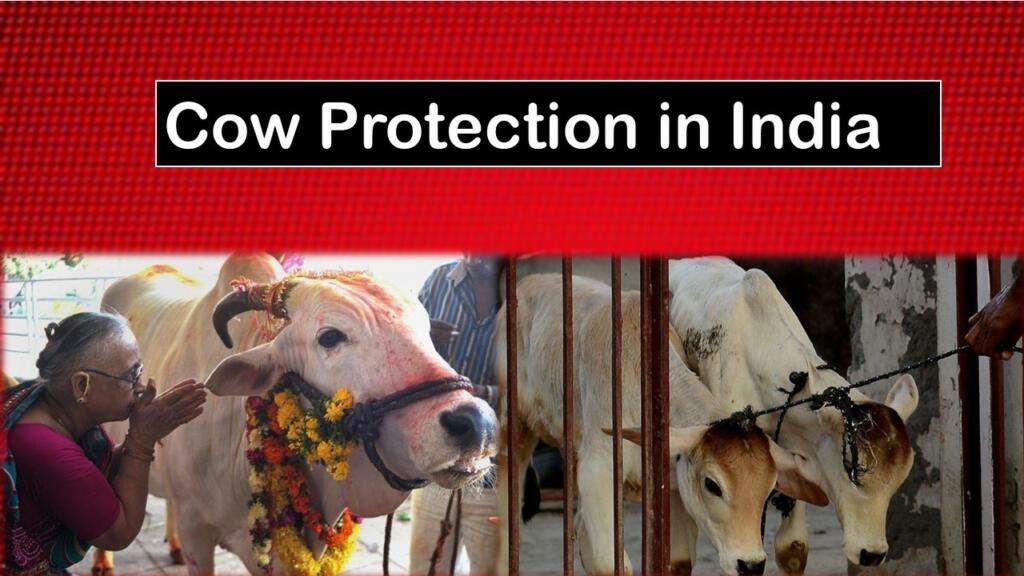Cow Protection India: Seventy five years have passed since India achieved Independence but the incidents of cow slaughter are on the rise, despite colossal legal documentations. The matter illustrates the anguish of the Tapi District Court Judge Samir Vinodchandra Vyas. The recent order of the Gujarat Court categorically brings out the cultural and religious significance of ‘cow’ in India. Hinduism reveres the cow as a sacred animal and consequently, most Indian states outlaws ‘cow slaughter’.
Looking from a vantage point, the ‘cow protection’ provisions were incorporated in the constitutional directive owing to ‘Vedic sacrosanct’ religiosity. Mahatma Gandhi also believed that cow protection was essential for preserving cultural heritage of India, thus making it imperative to look into the legal landscape around cow protection.
Religion Is Born Out Of Cow
The cow protection regulations in India vary from state to state, but in general, the legal landscape prohibits the slaughter of cows and imposes strict penalties on violations. Despite, national as well severe state legislations, the problem of cattle theft, illegal transportation of cow and allied evils are witnessing an upsurge in the society.
In an unsullied recent case, a Gujarat District Court Judge S. V. Vyas, had pronounced a sentence of ‘maximum punishment of life imprisonment and Rs 5 lakh as a fine’ to a 22-year-old for transporting cows and bullocks from Gujarat to Maharashtra. However, more than the mere punishment, the observations of the District Judge, highlighted greater significance to the “cultural and religious connotation of ‘cow’ as per the traditional ‘Sanatan Vedic Culture’.
The Session Court judge stressed on the need to shield the cattle stock of the nation and illustrated that “Cow is not only an animal, but it is equated to the mother.”
Also read: Did BBC just commit Contempt of Court ?
The 24-page verdict provides the “importance of cows” for the whole universe. Additionally, it bemoans the fact that “India has lost 75 per cent of godhan (cattle wealth), and only 25 per cent have remained alive. Further, the judge quoted Sanskrit slokas, and said, “Where cows are happy, wealth is gained, but when cows are sad, the wealth disappears… Cow is the mother of Rudra, daughter of Vasu, sister of Aditiputras and treasure of Dhrutroop Amrit.”
The judgement written in Gujarati also found mention that “Science has proved that atomic radiation doesn’t impact houses made of cow dung” and “drinking cow urine can cure many incurable diseases”.
The judge relentlessly lamented over the sorry state of affairs and said, “A time will come when people will forget to draw pictures of cows. Period of more than 70 years has elapsed since we got independence. Not only the cow slaughter has not stopped but it is reaching its climax. The problems that exist today are because of the increase in irascibility and hot temper. The only reason for the increase is the slaughter of cows. Till this is completely prohibited, the sattvic climate cannot have its effect.”
Also read: She burned her daughter and the Court reduced her sentence
Constitutional Directive to cow protection in India
The verdict of the learned district judge evidently bring to fore the agonizing condition of cattle stock in India. Despite the constitutional directive under Article 48 of the Constitution of India which directs ‘the state to make efforts for banning animal slaughtering of cows and calves and other milch and draught cattle’, the livestock are stolen and mercilessly butchered for economic gains.
The order of the judge is an eye opener that shallow politics over beef must stop and the Indian government should implement severe measures to protect cows.
The critics on the other hand, argue that the laws are often not enforced properly, and the lack of proper infrastructure for cow shelters and cow-based farming often lead to the animal being abandoned and left to suffer on the streets.
Despite this, the Parliament has enacted various laws related to cow protection in India. The most prominently used being the ‘Prevention of Cruelty to Animals Act, 1960’ that prohibits the slaughter of cows, calves, and other milch and draught animals, with certain exceptions.
In addition, the Indian Penal Code, 1860 under Section 428 and Section 429, prohibits the killing of cows and other cattle and prescribe punishment for the same. Further, the Livestock Importation Act, 1898 prohibits the import of certain animals, including cows, into India.
Also read: Reasons behind Grant of Remission in India
The Customs Act, 1962 regulates the import and export of goods, including beef and other meats. Moreover, the Food Safety and Standards (Prohibition and Restrictions on Sales) Regulations, 2011 regulates the sale of beef and other meats in India, thus, providing ample of national legislation to regulate the menace.
Furthermore, the state legislations also prescribe for separate set of rules and regulations that oversees the social evil in the respective states. However, the Apex Court and High Courts has also chipped-in with serious contributions. Mohd. Hanif Quareshi vs. State of Bihar is a landmark case in Indian legal history in which the Supreme Court of India upheld the constitutional validity of the Indian Prevention of Cow Slaughter Act, 1955.
Further, in the State of Gujarat v. Mirzapur Moti Kureshi Kassab Jamat, the Supreme Court of India upheld the constitutional validity of the Gujarat Animal Preservation Act, which banned the slaughter of cows and bulls, but also held that the Act could not be used to discriminate against any particular religious community. Thus, the general outlook of the judiciary validates the ‘Vedic sacrosanct’ religiosity on protection of cow in India.
Support TFI:
Support us to strengthen the ‘Right’ ideology of cultural nationalism by purchasing the best quality garments from TFI-STORE.COM
